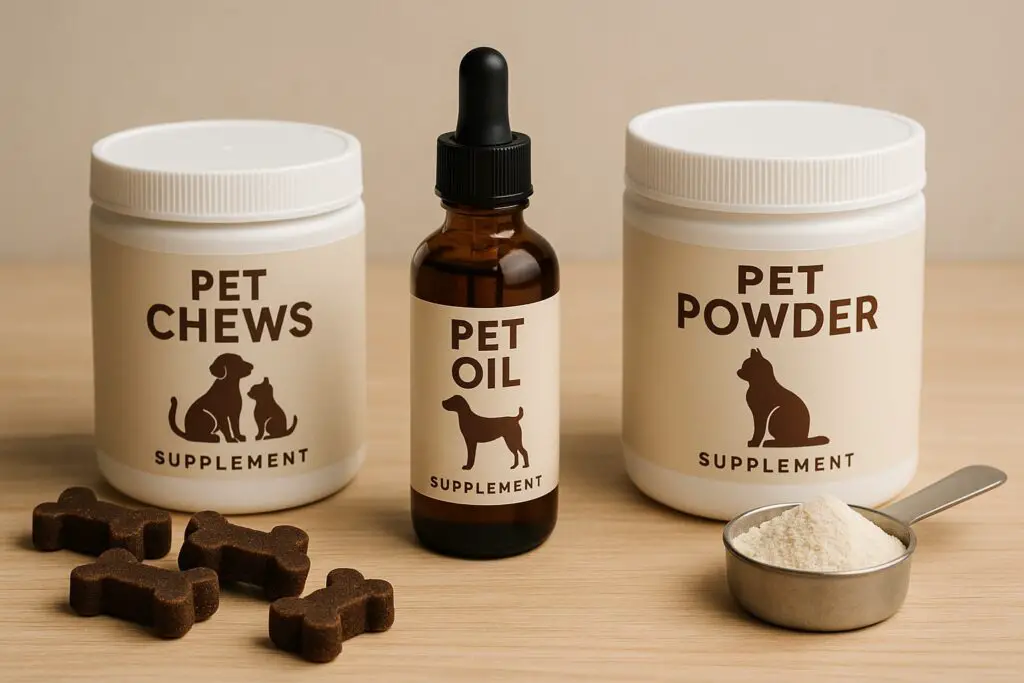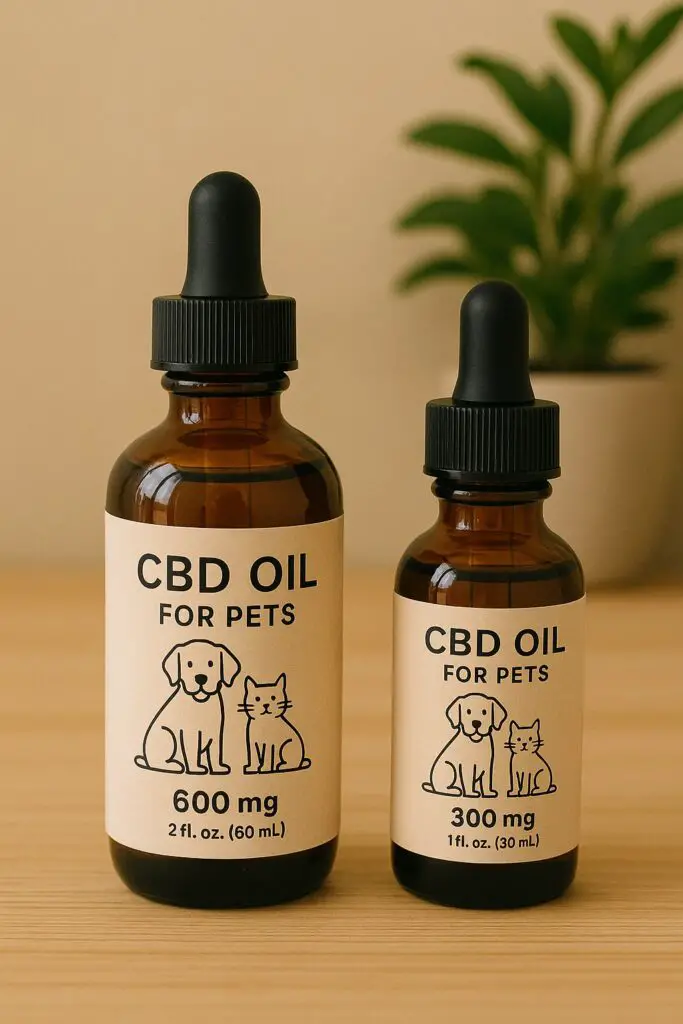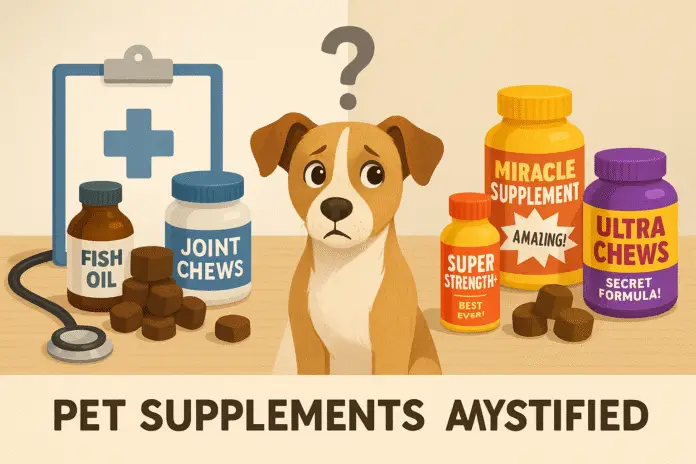Over the past decade, the pet wellness industry has exploded, with the global pet supplement market expected to surpass $1 billion annually. From calming chews to joint health tablets and immune boosters, the options seem endless. But are all these products really necessary? Or are some just clever marketing?
As a responsible pet parent, you want the best for your furry companion. But navigating the supplement aisle can be overwhelming. In this post, we break down what’s science-backed, what’s potentially helpful, and what’s pure hype—so you can make informed decisions for your pet’s well-being.
What Are Pet Supplements?

Pet supplements are products formulated to enhance a pet’s diet by providing essential nutrients, herbs, or compounds that may not be adequately supplied through commercial pet food alone. They come in a variety of forms:
- Tablets
- Powders
- Soft chews
- Liquids
- Capsules
These supplements typically target specific issues like joint support, digestion, immune function, anxiety relief, and skin health.
Science-Backed Supplements That Are Worth It
Here are some of the most commonly recommended pet supplements supported by research and veterinary professionals:
1. Glucosamine and Chondroitin
Best for: Joint health, arthritis, mobility in older pets
Glucosamine and chondroitin sulfate are naturally occurring substances in joint cartilage. Supplementing with these compounds has been shown to reduce inflammation and improve mobility in both dogs and cats, especially as they age.
Vet Tip: Start early if your pet is a large breed or showing early signs of joint discomfort.
2. Omega-3 Fatty Acids

Best for: Skin health, shiny coat, inflammation, brain function
Sourced from fish oil or krill, omega-3s (EPA and DHA) have anti-inflammatory benefits. They’re particularly helpful for pets with allergies, dry skin, arthritis, or heart conditions.
Note: Always choose purified fish oil designed for pets—never human-grade capsules.
3. Probiotics
Best for: Digestive health, immunity, diarrhea, antibiotic recovery
Probiotics help maintain a healthy balance of bacteria in your pet’s gut. A balanced microbiome supports digestion and even impacts mood and immunity.
Common strains to look for: Lactobacillus, Bifidobacterium, Enterococcus.
4. Multivitamins (When Needed)
While a high-quality, complete pet food usually covers nutritional bases, multivitamins can be useful for:
- Picky eaters
- Homemade diets
- Senior pets
- Pets recovering from illness
Ensure the multivitamin is species-specific—what’s good for dogs isn’t necessarily safe for cats.
Trending Supplements: Worth a Try or Just Hype?
1. CBD (Cannabidiol)
Claimed Benefits: Anxiety relief, pain management, anti-seizure
Reality: Research is still limited, though early results are promising. Some pets do experience relief from anxiety and inflammation.

Warning: Many CBD pet products are unregulated. Always ask your vet and look for third-party lab-tested options.
2. Collagen
Collagen supports skin elasticity, joint cartilage, and nails. While its use in humans is well-documented, studies in pets are emerging. It’s likely beneficial, but not essential unless your vet recommends it.
3. Ashwagandha, Chamomile & Herbal Blends
These herbs are often marketed in calming chews or immunity blends. While some ingredients have shown mild calming effects, dosages are not well-regulated and may vary in effectiveness.
Tip: Herbs aren’t automatically safe. Always double-check with your veterinarian.
Supplements You Can Skip (And Why)
Despite flashy packaging and persuasive claims, not all supplements are created equal. Here are some to approach with caution—or skip entirely.
1. Weight Loss Supplements
Often full of filler and untested ingredients, these are better replaced with vet-approved weight management plans, proper nutrition, and exercise.
2. “Detox” or “Cleanse” Supplements
Your pet’s liver and kidneys already do a great job detoxifying. These products are not backed by science and may do more harm than good.
3. Over-the-Counter “All-in-One” Gimmicks
Multi-benefit chews with vague claims like “total wellness” are often under-dosed in the beneficial ingredients and overpriced. Always check the active ingredients and consult your vet.
Natural Alternatives That Work
Sometimes, whole food sources can be better (and safer) than processed supplements. Here are a few natural, vet-recommended additions:

- Pumpkin: Rich in fiber and beta-carotene. Great for digestive regularity.
- Sardines (in water): A good source of omega-3s. Ideal for dogs once or twice a week.
- Blueberries: Loaded with antioxidants. Safe in moderation.
- Turmeric: Anti-inflammatory but should be given in proper doses.
- Bone Broth: Contains amino acids and collagen; excellent for hydration and recovery.
Always introduce new foods slowly and in moderation. And again—ask your vet.
How to Choose Quality Supplements
To ensure you’re buying a high-quality supplement that will benefit your pet and not waste your money, look for:
- NASC Seal: The National Animal Supplement Council regulates safety and labeling.
- Veterinarian-Formulated: Ideally, the product is developed by or endorsed by vets.
- Clear Labeling: Dosages, ingredients, and instructions should be clearly outlined.
- Third-Party Testing: Look for brands that undergo independent lab testing.
When Should You Give Supplements?
Every pet is different. Some scenarios that might justify supplementation include:
- Aging pets with arthritis or declining energy
- Pets on restrictive or homemade diets
- Animals recovering from illness or surgery
- High-stress environments or frequent travel
- Chronic skin issues or digestive problems
Your veterinarian can run blood panels or physical assessments to determine specific needs.
Final Thoughts: Do Pet Supplements Work?

Yes—some do. But many don’t live up to the hype. Pet supplements can be beneficial when used strategically, guided by veterinary insight, and chosen carefully. Don’t be swayed by emotional marketing. Instead, focus on what your individual pet needs and stick with reputable brands.



